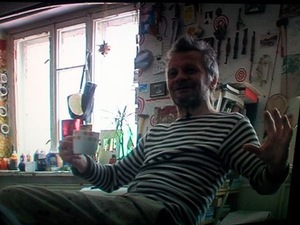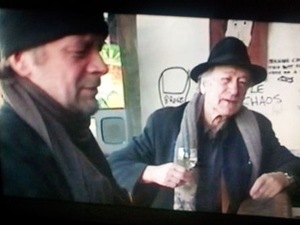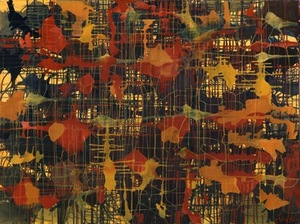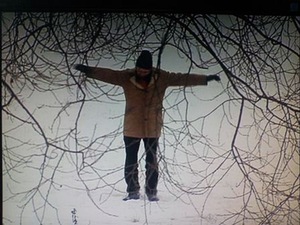LANDSCAPES OF (SUB)CONSCIOUSNESS OF AUGUSTAS VARKALIS 8
In brief: If, after taking peyote, A.Huxley visited Kaunas Žalgiris Arena on the evening of January 18, where the painting exhibition “Landscape” of Eugenijus Varkulevičius-Varkalis was opened and the film of E. Striogaitė “August Varkalis” was shown, he would have scratched his head in astonishment. Unfortunately, A.Huxley was dead that evening.
However, the art critic Dr Kristina Budrytė-Genevičė, who cited him, opened the door to the painter’s world: “Why is this painting exhibition important? If you stand at one work for hours or if you scan through the entire series, the impression of endlessness appears. The huge subtle world involves us. While we live with short definitions in daily life – the sky is blue or grey, the sun is yellow, here one can view daily things in a more poetical manner…”
The biography of Eugenijus Varkulevičius is colorful as a kaleidoscope. He was born in Kaunas in 1956, lived in old Samogitian villages in 1983-1987 (in Dovainonys, Beržoras, Šarnelė), where he studied Lithuanian folk painting and restored Stations of the Cross. In 1990 – 1994 he lived and worked in Berlin, in 1994 - 2005 he lived in New York, where he filmed the collapsing “twins” on September 11. He was filmed in experimental films, participated in happenings, festivals, created films drawn by hand, organized solo exhibitions and participated in group shows. He founded the band Music on the 2nd Street along with Jonas Mekas and Dalius Naujokaitis in New York, created music for films of J. Mekas, Julius Ziz, illustrated books of J. Mekas “My Nights”, “Words and Letters”. From 2005 he returned to live and create in his native Kaunas, where he dreams of new and new “landscapes” now.
To get to know the author or to step into the same water where he bathes, one needs at least three dimensions: that of the author, author’s works and (sub)objective perspective from another shore.
All 3Ds opened up on that evening – the artist told stories, his canvases told stories of stories, and E.Striogaitė narrated the story about the author in the film “August Varkalis”, which captured (un)daily details prudently.




